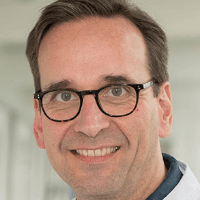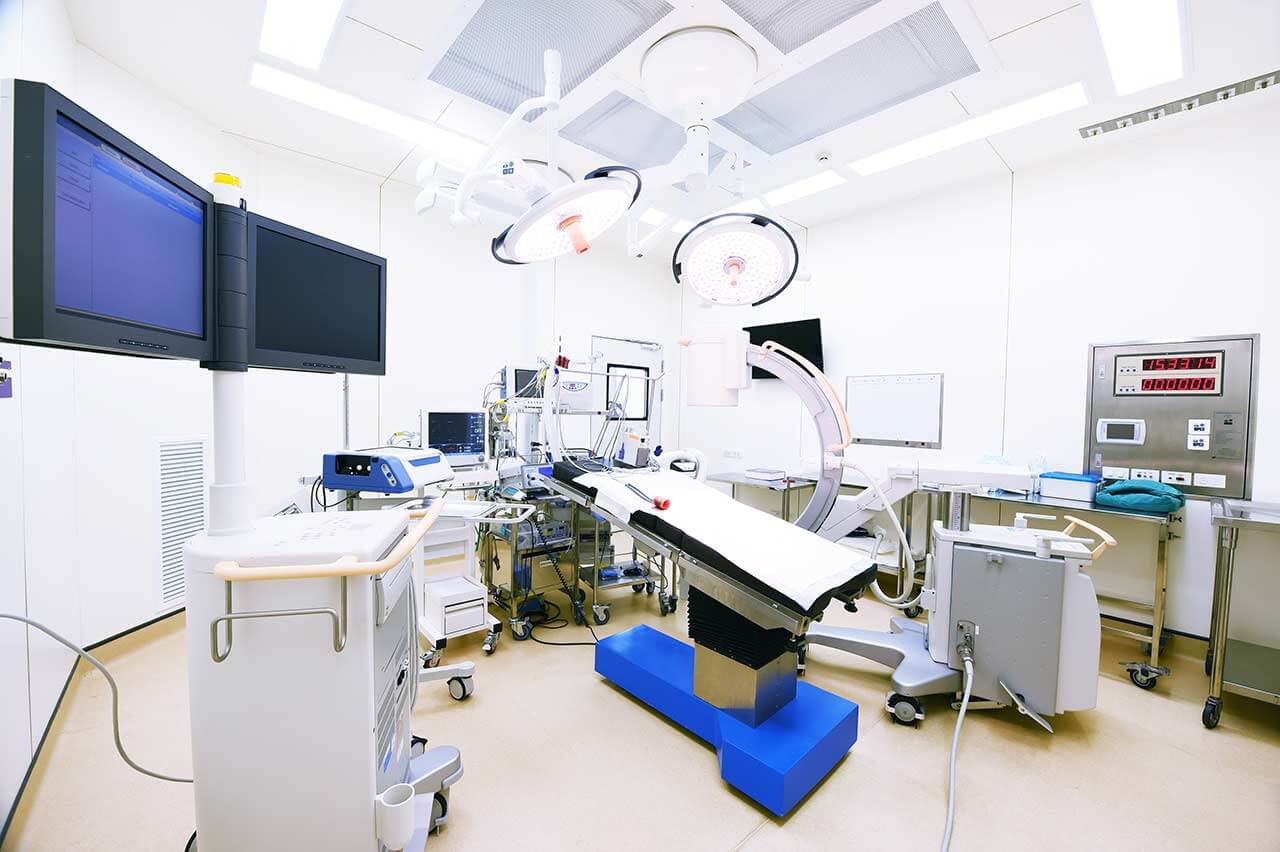
The program includes:
- Initial presentation in the clinic
- clinical history taking
- review of medical records
- physical examination
- laboratory tests:
- complete blood count
- biochemical analysis of blood
- thyroid function test (TSH-basal, fT3, fT4)
- mineral metabolism analysis (Na, K, Ca, Mg)
- lipid metabolism (HDL/LDL, cholesterol, triglycerides,
Lip(a), homocysteine) - iron content (ferritin, iron)
- blood coagulation analysis (aPTT, PT, INR)
- metabolic status (uric acid, total glucose, HbA1c)
- inflammatory parameters (CRP, ESR)
- cardiovascular disease risk markers
- lung function test (Spirometry)
- resting and exercise ECG
- Holter monitoring (24h)
- color doppler echocardiography
- transesophageal echocardiography (tee)
- color doppler sonography of cerebral vessels
- heart catheterization
- preparation according to preoperative standard
- mitral valve replacement
- symptomatic treatment
- control examinations
- the cost of essential medicines and materials
- nursing services
- full hospital accommodation
- explanation of future recommendations
- written statement
Service
You may also book:
 BookingHealth Price from:
BookingHealth Price from:
About the department
According to the Focus magazine, the Department of Cardiac Surgery at the University Hospital Bonn ranks among the top German departments specializing in the surgical treatment of heart diseases!
The department offers the full range of modern surgical interventions for the treatment of diseases of the heart, coronary vessels and thoracic aorta (with the exception of transplantation of the thoracic organs). An excellently trained team of specialists and state-of-the-art technologies guarantee the best medical care adapted to the individual needs and wishes of patients. The department is headed by Prof. Dr. med. Hendrik Treede.
The main clinical activities of the department include heart valve surgery, coronary artery bypass grafting, surgical interventions on the thoracic aorta, electrophysiological therapy in arrhythmias (implantation of pacemakers and defibrillators), as well as the implantation of special systems for mechanical support of the heart.
It is natural that heart surgery is quite complex in its nature, so after the intervention the patient is necessarily observed in the conditions of an ultra-modern intensive care unit equipped with heart-lung machines, devices for monitoring vital functions, such as blood circulation, respiration, kidney function, etc. In addition, the unit is staffed by the specially trained doctors and nursing staff, who have a clear and effective action plan aimed at the improvement of the patient’s condition in destabilization.
The department performs more than 1,700 surgeries annually, 1,000 of which are performed using the heart-lung machine or on the open heart. In cooperation with the Department of Cardiology, there are performed about 150 heart valve implantations using catheter techniques.
The department specializes in the following surgical interventions:
- Heart valve surgery
- Implantation of mechanical prosthetic heart valves
- Implantation of biological prosthetic heart valves
- Aortic valve reconstruction
- Transcatheter aortic valve implantation (TAVI)
- Coronary artery bypass grafting in severe coronary artery disease
- Surgical treatment of acute and chronic aortic diseases (as a rule, operations are performed using the heart-lung machine)
- Supracoronary ascending aortic replacement
- Bentall procedure
- Wheat operation
- David procedure
- Aortic arch surgery
- Thoracic endovascular aortic repair (TEVAR)
- Surgical treatment of heart arrhythmias (electrophysiological therapy), also using modern sparing techniques
- Pacemaker implantation
- Cardioverter defibrillator implantation
- Revision interventions for the functional correction of pacemakers and defibrillators
- Implantation of mechanical heart support systems
- Other surgical services and types of operations
Curriculum vitae
Education
- 1990 - 1997 Study of Human Medicine, University of Hamburg.
- 09.1995 - 10.1995 Clerkship in Massachusetts General Hospital, Department of Plastic and Reconstructive Surgery (Prof. May), Harvard Medical School, Boston, Massachusetts, USA.
- 07.1995 - 08.1995 Clerkship at the Brigham and Women's Hospital, Department of Thoracic Surgery (Prof. Sugarbaker), Harvard Medical School, Boston, Massachusetts, USA.
- 2005 Doctoral thesis defense with honors. Subject: "The effect of continuous veno-venous hemofiltration on the development and progress of experimentally induced hemorrhagic necrotic pancreatitis in the animal model of a pig", Department of General Surgery, University Hospital Hamburg-Eppendorf.
- 2012 Habilitation and Venia Legendi in Cardiac Surgery. Subject: "Transcatheter aortic valve implantation (TAVI): assessment of a new therapy for minimally invasive catheter implantation of the aortic valve in patients with a high risk of surgery or contraindications to the surgical treatment", University of Hamburg.
- 2014 W2 Professor in Minimally Invasive and Interventional Heart Surgery, University of Hamburg, Faculty of Medicine, University Hospital Hamburg.
Professional Practice
- Since 04.2007 Leading Senior Physician at the University Heart Center Hamburg (Director: Prof. Dr. med. H. Reichenspurner).
- Program Manager in Minimally Invasive Heart Surgery.
- Responsible for Transcatheter Aortic Valve Replacement.
- Surgical Director of the Program for Implantation of Event Recorders and Defibrillators.
- Probe Laser Extraction.
- Personal Senior Consultant.
- Head of the Lung Transplantation Program (2005 - 2010).
- 01.2007 Medical Specialist in Heart Surgery.
- 07.2001 - 02.2007 Assistant Physician in the Department of Cardiac Surgery, University Medical Center Hamburg.
- 1997 - 2001 Intern and Assistant Physician in the Department of Cardiac Surgery at the University Hospital Grosshadern, Munich.
- 06.1999 Full admission to medical practice.
Membership in Professional Societies
- German Society for Thoracic And Cardiovascular Surgery (DGTHG).
- European Association for Cardiothoracic Surgery (EACTS).
- German Society of Cardiology (DGK).
- European Society of Cardiology (ESC).
- International Society for Minimally Invasive Cardiothoracic Surgery (ISMICS).
- International Society for Heart and Lung Transplantation (ISHLT).
Photo of the doctor: (c) Universitätsklinikum Bonn
About hospital
According to the authoritative Focus magazine, the University Hospital Bonn ranks among the top ten medical facilities in Germany!
The hospital was opened on January 1, 2001, although in fact it inherits the medical facility, which operated at the Faculty of Medicine of the University of Bonn. The hospital in Germany combines all the highest standards of modern university medicine of the international level. A highly competent team of experienced physicians, which consists of more than 8,000 employees from various fields, takes care of the patients’ health.
The hospital has 32 specialized departments and 23 institutes, which implement the highest standards of treatment in Germany. On their basis, in addition to the successful clinical activities, the productive research and training of young specialists are carried out. Also, the hospital has 10 intensive care units and more than 30 cutting-edge operating rooms. They are equipped with the advanced surgical, navigation and monitoring systems, which provide sparing and the most effective surgical treatment. The total number of places for hospitalization is 1,250 beds.
The hospital presents all fields of medicine, while many of them are awarded by prestigious German and international certificates. For example, in 2007, the Comprehensive Cancer Center of the hospital became one of the four winners at the nationwide competition among Cancer Centers of Excellence. The research focuses primarily on the clinical genetics and genetic epidemiology, neurology, immunology and infectiology, hepatology and gastroenterology, and diseases of the cardiovascular system. The research findings contribute to the development of new therapeutic methods and overall improvement of treatment in Germany.
The main value for all employees of the hospital in Germany is human health, his individual needs and wishes, therefore, despite the high-tech infrastructure, the focus remains on the human attitude and respect for each patient.
Photo: (с) depositphotos
Accommodation in hospital
Patients rooms
The patients of the University Hospital Bonn live in cozy single, double and triple rooms, designed in bright colors. The standard room furnishing includes a comfortable bed with a remote control, a bedside table, a wardrobe, a table and chairs, as well as a TV and a telephone. Each patient room is equipped with an ensuite bathroom with toilet and shower. The hospital also provides enhanced-comfort rooms.
Meals and Menus
The patients of the hospital are offered tasty and balanced three meals a day: breakfast, lunch and dinner. Every day each meal features three different menus, including a vegetarian one. If you for some reason do not eat all the food, you will be offered an individual menu. Please inform the medical staff about your dietary preferences prior to the treatment.
Further details
Standard rooms include:
Religion
Christian priests are available for the patients at any time. Representatives of other religions may be requested at any time.
Accompanying person
Your companion may stay with you in your room or at a hotel of your choice during the fixed program.
Hotel
You may stay at the hotel during the outpatient program. Our employees will support you for selecting the best option.
The hospital offers a full range of laboratory tests (general, hormonal, tests for infections, antibodies, tumor markers, etc.), genetic tests, various modifications of ultrasound scans, CT scans, MRI and PET / CT, angiography, myelography, biopsy and other examinations. Treatment with medications, endoscopic and robotic operations, stereotaxic interventions is carried out here, modern types of radiation therapy are also used. The hospital offers patients all the necessary therapeutic techniques.
- Surgical treatment of the brain tumors, tumors of spinal cord and spine
- Replacement of all joints, resection arthroplasty
- Deep brain stimulation and vagus nerve stimulation in patients with epilepsy
- Multimodal complex treatment of Parkinson disease
- Thoracic endovascular aortic repair (TEVAR)
These are benign and malignant breast pathologies, malignant tumors of various localizations, neuromuscular diseases, stroke, retinal pathologies and various visual impairments, infertility, autoimmune diseases, epilepsy, coronary artery disease and myocardial infarction, leukemia and other pathologies.
- Ophthalmology
- Epileptology
- Reproductive medicine
- Hematology and oncology
- Neurosurgery
Over 8,000 highly qualified doctors and other employees work at the hospital.





